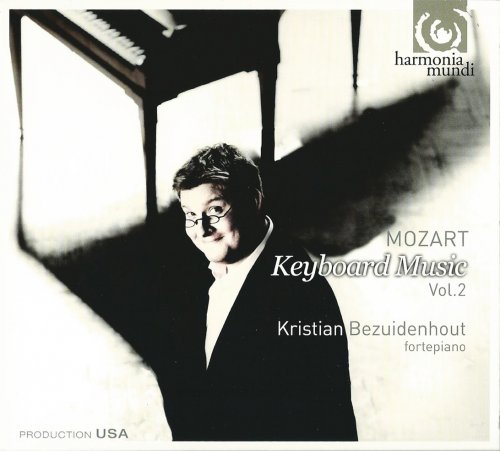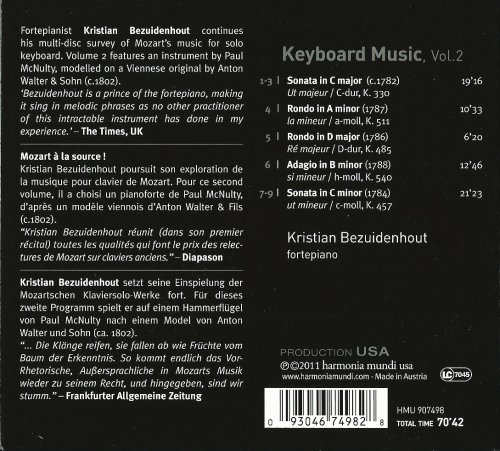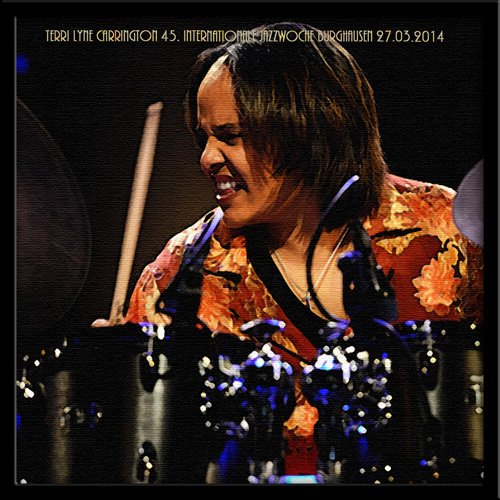Kristian Bezuidenhout - Mozart: Keyboard Music, Vol. 2 (2011)

Artist: Kristian Bezuidenhout
Title: Mozart: Keyboard Music, Vol. 2
Year Of Release: 2011
Label: Harmonia Mundi
Genre: Classical
Quality: FLAC (image+.cue,log,scans)
Total Time: 01:10:36
Total Size: 322 Mb
WebSite: Album Preview
Tracklist: Title: Mozart: Keyboard Music, Vol. 2
Year Of Release: 2011
Label: Harmonia Mundi
Genre: Classical
Quality: FLAC (image+.cue,log,scans)
Total Time: 01:10:36
Total Size: 322 Mb
WebSite: Album Preview
Wolfgang Amadeus Mozart (1756-1791)
Sonata In C Major, K.330 (c.1782) (19:16)
1. 1. Allegro Moderato 6:30
2. 2. Andante Cantabile 6:53
3. 3. Allegretto 5:59
4. Rondo In A Minor, K. 511 10:33
5. Rondo In D Major, K. 485 6:20
6. Adagio In B Minor, K. 540 12:46
Sonata In C Minor, K. 457 (21:23)
7. 1. Molto Allegro 8:40
8. 2. Adagio 7:54
9. 3. Allegro Assai 4:48
Performers:
Kristian Bezuidenhout - fortepiano
South African-born keyboardist Kristian Bezuidenhout seems to search for a middle ground between those who treat the fortepiano as a kind of modified harpsichord and those who stress the ways its percussive potential can highlight the incipient Romantic qualities in music of the late 18th century. On this collection of Mozart piano works, he makes full use of the potential of his instrument, a copy by American-Czech builder Paul McNulty of an 1802 Viennese instrument by Anton Walter, often deploying the pedals to develop a range of sounds that take on added color from the unequal-temperament tuning. Yet his basic mode of playing is not terribly expressive. The combination works well in the muscular works that bookend the album, with the lower ranges of the McNulty fortepiano bringing out the full Beethovenian power of the Piano Sonata in C minor, K. 457 (played, unusually, without its introductory Fantasia in C minor, K. 475), and of the rather symphonic Piano Sonata in C major, K. 330. The smaller pieces at the center of the program suffer a bit from the relatively inflexible melodic idiom. To give great pathos to the bleak Rondo in A minor, K. 511, and Adagio in B minor, K. 540, may be to rely too much on knowledge of what was coming next stylistically, but the Adagio is taken at something more than the designated clip, and there's room for more emotion here than Bezuidenhout allows. Some variation is justifiable in repeats, but Bezuidenhout pushes the envelope; the flourish in the exposition repeat of the Adagio in B minor seems at odds with the exhausted, enervated quality of the music. The main attraction here may be the fortepiano itself, with its strong, clear tone; it begins to approach a grand in power, but the colors are different. Harmonia Mundi's studio sound is excellent and fully attuned to Bezuidenhout's rereading of the big sonatas. Notes are in English, French, and German.

![Emilie-Claire Barlow - La plus belle saison (2026) [Hi-Res] Emilie-Claire Barlow - La plus belle saison (2026) [Hi-Res]](https://www.dibpic.com/uploads/posts/2026-02/1770314882_cover.jpg)


![Rok Zalokar - Pieces for Collective Change (2025) [Hi-Res] Rok Zalokar - Pieces for Collective Change (2025) [Hi-Res]](https://img.israbox.com/img/2026-02/09/bdwqrbl1honjxisedtld75o3t.jpg)
![Joe Lovano, Winston Salem Symphony & Michelle Merrill - a raft, the sky, the wild sea (2026) [Hi-Res] Joe Lovano, Winston Salem Symphony & Michelle Merrill - a raft, the sky, the wild sea (2026) [Hi-Res]](https://www.dibpic.com/uploads/posts/2026-02/1770314335_cover.jpg)


![Malene Mortensen & Christian Sands - Malene & Christian (2026) [Hi-Res] Malene Mortensen & Christian Sands - Malene & Christian (2026) [Hi-Res]](https://www.dibpic.com/uploads/posts/2026-02/1770214038_ye95svxsd11r2_600.jpg)
![Batsumi - Batsumi (2021) [Hi-Res] Batsumi - Batsumi (2021) [Hi-Res]](https://www.dibpic.com/uploads/posts/2021-06/1623332057_1280x1280.jpg)